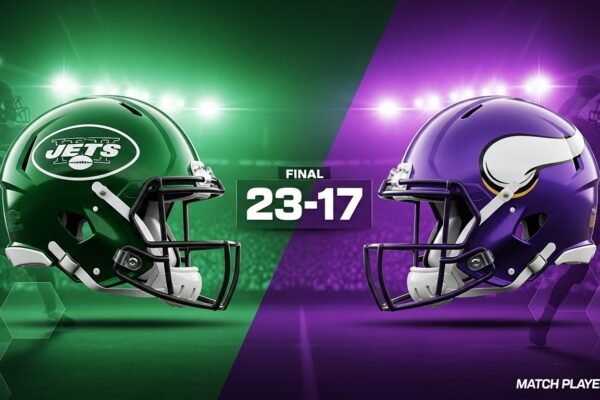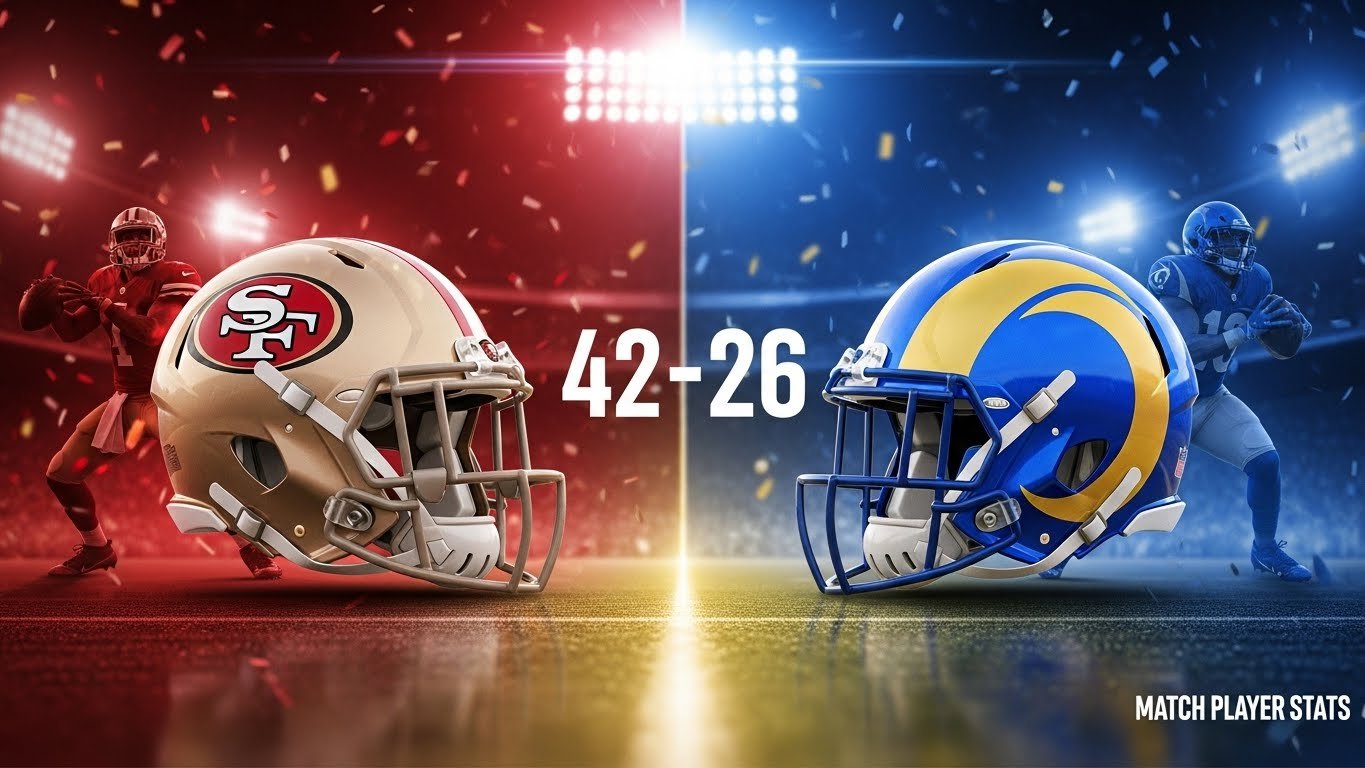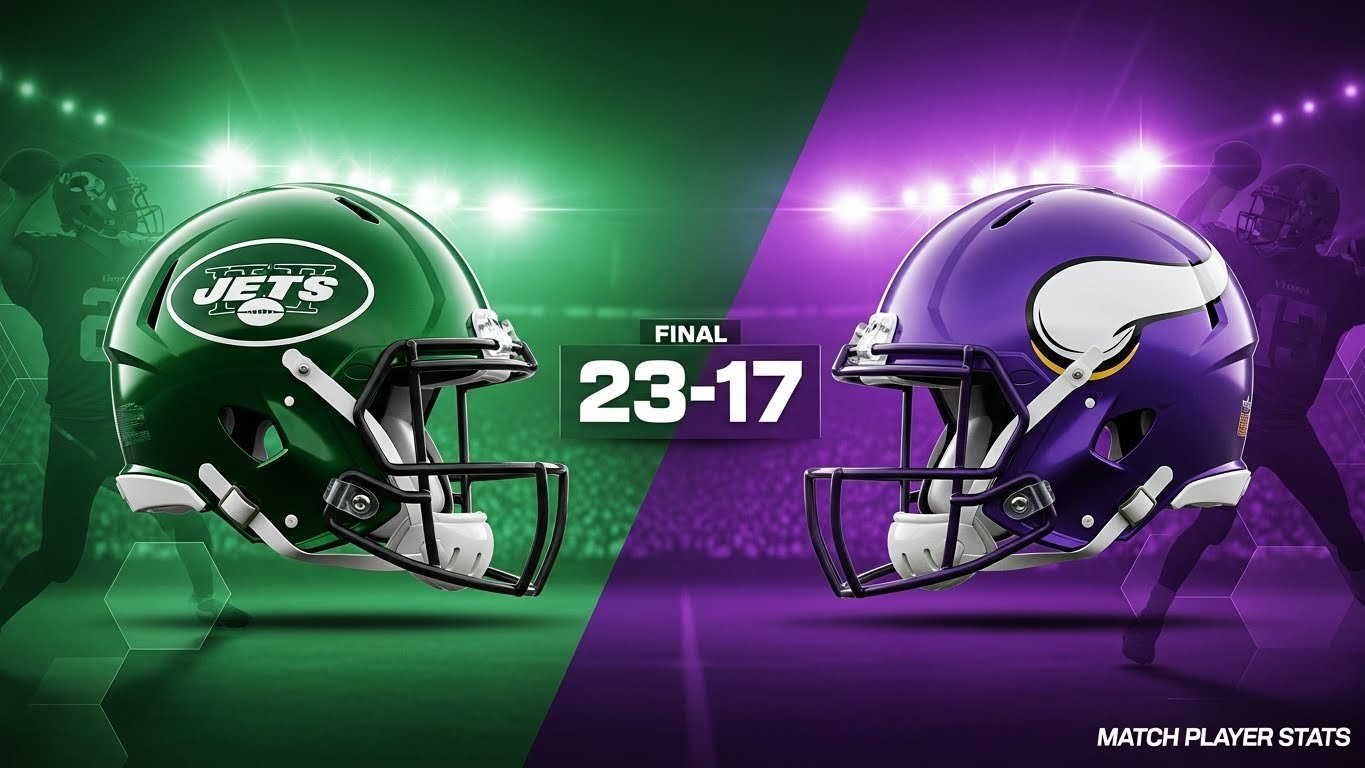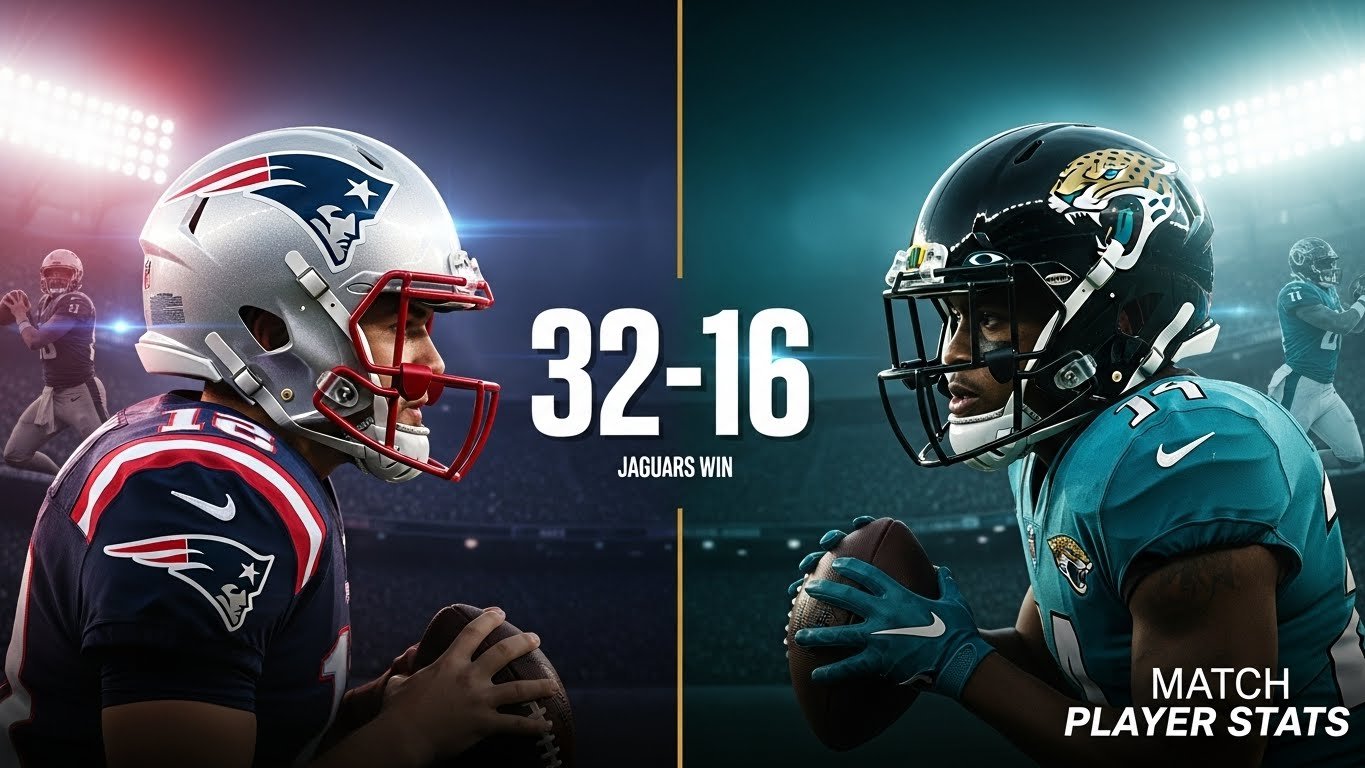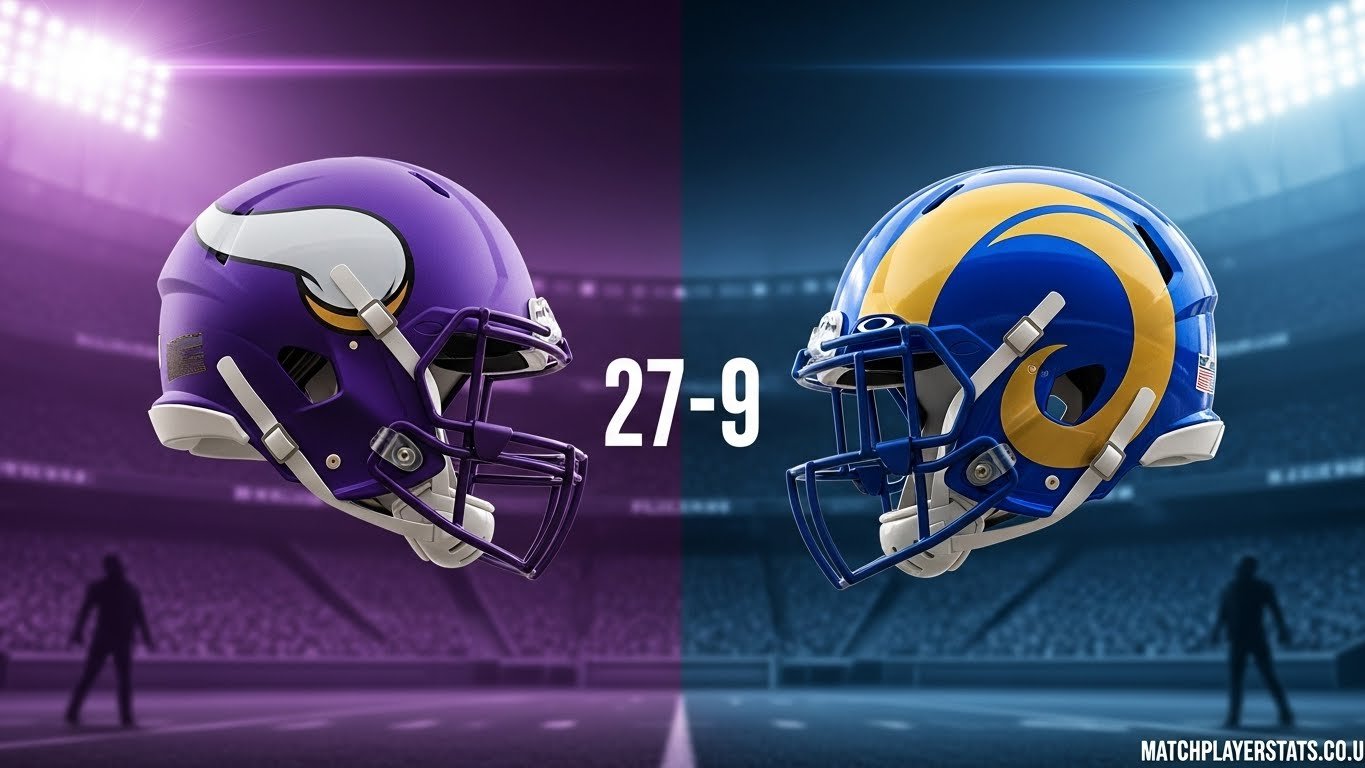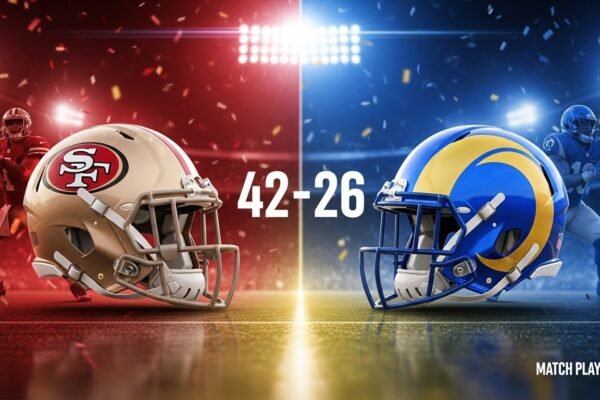
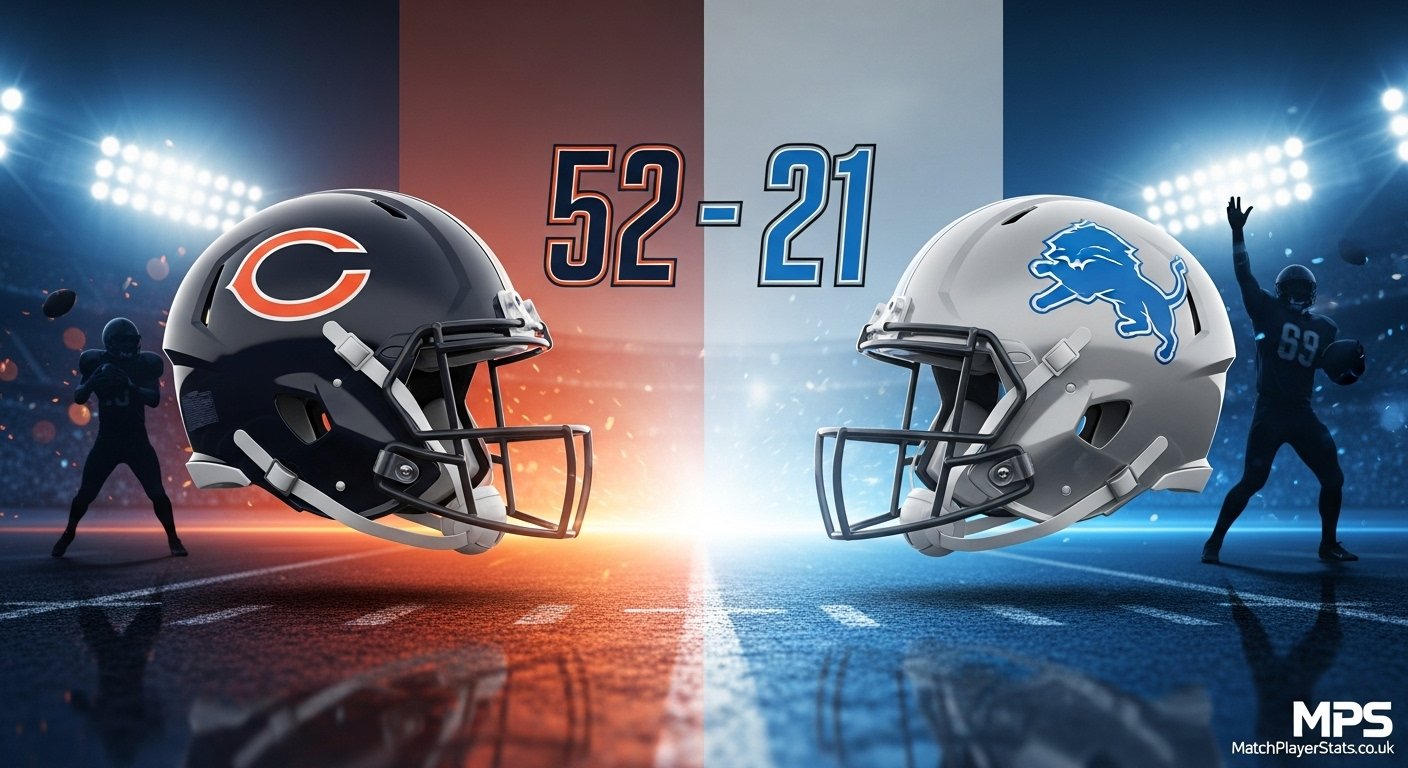
Chicago Bears vs Detroit Lions Match Player Stats (Sep 14, 2025)
Detroit destroyed Chicago 52 to 21 on September 14, 2025, at Ford Field in front of 64,201 fans who watched Ben Johnson’s return as the Bears’ new head coach turn into a nightmare. The indoor stadium provided ideal conditions for an offensive explosion.
Jared Goff threw five touchdown passes for 334 yards, while Amon-Ra St. Brown caught three of those scores for 115 yards in the first three-touchdown game of his five-year career. Caleb Williams threw for 207 yards and connected with Rome Odunze twice for touchdowns, including the rookie’s career-high 128-yard performance, but four sacks and an interception sank Chicago to 0 and 2 in this NFC North divisional matchup.
Table of Contents
Game Leaders
| Category | Chicago Bears | Detroit Lions |
|---|---|---|
| Passing | C. Williams: 19/30, 207 yards, 2 TD, 1 INT | J. Goff: 23/28, 334 yards, 5 TD |
| Rushing | D. Swift: 12 carries, 63 yards, 1 TD | J. Gibbs: 12 carries, 94 yards, 1 TD |
| Receiving | R. Odunze: 7 rec, 128 yards, 2 TD | A. St. Brown: 9 rec, 115 yards, 3 TD |
| Tackles | J. Brisker: 9 total, 7 solo | J. Campbell: 8 total, 4 solo |
Complete Team Statistics
| Stat | Chicago | Detroit |
|---|---|---|
| Final Score | 21 | 52 |
| Total Yards | 339 | 511 |
| First Downs | 19 | 25 |
| Time of Possession | 29:40 | 30:20 |
| Third Down | 7/13 (54%) | 4/10 (40%) |
| Fourth Down | 0/2 (0%) | 1/1 (100%) |
| Penalties | 8 for 50 yards | 3 for 28 yards |
| Turnovers | 2 | 0 |
| Red Zone | 2/2 (100%) | 6/7 (86%) |
| Yards Per Play | 5.3 | 8.8 |
This statistical breakdown shows Detroit averaging 8.8 yards per play, a new franchise record. The Lions became the first team in franchise history to combine 500 total yards, five passing touchdowns, and two rushing touchdowns in the same game, per the Detroit Lions’ official game statistics.
Passing Stats Breakdown: Goff’s 5 TDs vs Williams’ Struggles
| Player | Team | Comp/Att | Yards | YPA | TD | INT | Sacks | Rating | Long |
|---|---|---|---|---|---|---|---|---|---|
| Jared Goff | DET | 23/28 | 334 | 11.9 | 5 | 0 | 0 | 156.0 | 64 |
| Caleb Williams | CHI | 19/30 | 207 | 6.9 | 2 | 1 | 4 | 91.9 | 37 |
| Tyson Bagent | CHI | 2/3 | 27 | 9.0 | 0 | 0 | 0 | 95.1 | 22 |
Goff dissected the defensive scheme designed by Johnson’s coaching staff, completing 82.1% of his passes without facing a single sack. Goff’s near-perfect 156.0 passer rating resulted from spreading the ball to eight different receivers. Williams started strong but finished just 11 of his final 20 attempts as Detroit brought consistent pressure.
The same pattern emerged in Week 1 against Minnesota, where Williams started hot then struggled late. Williams took four sacks for 29 yards lost as Detroit’s pass rushers consistently won one-on-one matchups.
Guards Christian Mahogany and Tate Ratledge transformed Detroit’s pass protection, allowing just one pressure combined after surrendering seven pressures and three sacks at Green Bay in Week 1. Goff hit St. Brown for 34 yards on the opening play, establishing the tempo that carried through four quarters.
Rushing Attack: Gibbs’ 94 Yards Lead Detroit
| Player | Team | Carries | Yards | Average | TD | Long | YBC | YAC |
|---|---|---|---|---|---|---|---|---|
| Jahmyr Gibbs | DET | 12 | 94 | 7.8 | 1 | 42 | 80 | 14 |
| D’Andre Swift | CHI | 12 | 63 | 5.3 | 1 | 20 | 49 | 14 |
| David Montgomery | DET | 11 | 57 | 5.2 | 1 | 18 | 35 | 22 |
| Kyle Monangai | CHI | 7 | 28 | 4.0 | 0 | 10 | 16 | 12 |
| Caleb Williams | CHI | 5 | 27 | 5.4 | 0 | 10 | 27 | 0 |
A 42-yard burst in the third quarter showed exactly why Detroit drafted Jahmyr Gibbs. He cut through a gap on the right side, made one linebacker miss at the second level, and raced untouched down the sideline. Most of his production came before contact. Detroit’s offensive line created 3.6 yards before contact per carry, while Chicago’s line created only 2.6.
That difference created manageable down-and-distance situations for Detroit. Second-and-4 became the norm instead of second-and-7. Montgomery provided the physical complement, grinding out 57 yards and punching in a one-yard touchdown. The Lions’ running backs combined for 151 yards and two touchdowns on 23 carries at 6.6 per attempt.
Swift led Chicago with 63 yards on 12 carries but couldn’t establish rhythm when trailing by multiple scores. That forced Williams to attack through the air despite constant pressure from Detroit’s front four.
Receiving Statistics: Odunze’s Career Day
| Player | Team | Targets | Rec | Yards | YPR | TD | Long | YAC |
|---|---|---|---|---|---|---|---|---|
| Rome Odunze | CHI | 11 | 7 | 128 | 18.3 | 2 | 37 | 39 |
| Amon-Ra St. Brown | DET | 11 | 9 | 115 | 12.8 | 3 | 34 | 48 |
| Jameson Williams | DET | 4 | 2 | 108 | 54.0 | 1 | 64 | 49 |
| D.J. Moore | CHI | 6 | 5 | 46 | 9.2 | 0 | 18 | 15 |
| Cole Kmet | CHI | 2 | 2 | 29 | 14.5 | 0 | 22 | 12 |
| Isaac TeSlaa | DET | 1 | 1 | 29 | 29.0 | 0 | 29 | 2 |
| Brock Wright | DET | 3 | 3 | 28 | 9.3 | 1 | 12 | 25 |
| Sam LaPorta | DET | 4 | 3 | 26 | 8.7 | 0 | 10 | 17 |
St. Brown caught touchdowns from four, eight, and four yards out against his former coordinator’s defensive scheme. Goff found him on slants, posts, and fade routes near the goal line. St. Brown’s nine receptions marked the first three-touchdown game of his five-year career.
Odunze beat press coverage for a 28-yard touchdown on Chicago’s opening drive, tying the game at 7. Odunze’s second score came on a six-yard pass in the second quarter that cut Detroit’s lead to 21 to 14. The rookie’s precise routes and reliable hands gave Williams a go-to receiver despite constant pressure. Odunze finished with 128 yards across seven catches, including 39 yards after contact.
Jameson Williams ran past Chicago’s cornerbacks twice. He scored on a 44-yard touchdown in the third quarter when Goff hit him in stride down the left sideline. Chicago’s cornerbacks couldn’t match his 4.4 speed.
The Play That Shifted Momentum
Isaac TeSlaa’s one-handed diving catch with 21 seconds remaining in the first half changed the game. Goff lofted a pass down the right sideline where TeSlaa extended fully, snagged the ball with his right hand, and landed just inside the boundary at the six-yard line. Officials initially ruled him out of bounds, but replay review showed his knee touched inbounds before rolling out. The review triggered a 10-second runoff, leaving six seconds on the clock. Two plays later, Goff threw a four-yard touchdown to St. Brown with two seconds remaining, giving Detroit a 28 to 14 halftime lead instead of 21 to 14.
The rookie tight end finished Detroit’s preseason with three touchdown catches in exhibition games, and his regular season debut showed the same reliable hands.
Defensive Performance
Tackle Leaders
| Player | Team | Tackles | Solo | TFL | QB Hits |
|---|---|---|---|---|---|
| Jaquan Brisker | CHI | 9 | 7 | 0 | 0 |
| Jack Campbell | DET | 8 | 4 | 0 | 0 |
| Tremaine Edmunds | CHI | 7 | 6 | 1 | 0 |
| Tyrique Stevenson | CHI | 7 | 5 | 1 | 0 |
| Brian Branch | DET | 6 | 6 | 2 | 1 |
Pass Rush Production
While Branch and Campbell led in tackles, Detroit’s pass rushers pressured Williams throughout the game.
| Player | Team | Sacks | Pressures | QB Hits |
|---|---|---|---|---|
| Aidan Hutchinson | DET | 1 | 5 | 1 |
| Al-Quadin Muhammad | DET | 1 | 3 | 2 |
| Marcus Davenport | DET | 1 | 2 | 1 |
| Brian Branch | DET | 1 | 2 | 1 |
| Gervon Dexter | CHI | 1 | 1 | 1 |
Detroit sacked Williams four times with four different defenders. Hutchinson recorded five total pressures despite facing double teams most of the game. Muhammad provided crucial pressure opposite Hutchinson, recording his first sack of the season.
Turnovers and Big Plays
Brian Branch forced the game’s turning point in the second quarter. He shot through the line untouched and drove his helmet into Swift’s midsection just as the running back secured a short pass. The ball popped loose immediately, and Campbell fell on it at Detroit’s 32-yard line. Chicago’s defense held, forcing a three-and-out that led to Jake Bates missing a 55-yard field goal wide left when the game was still competitive at 14 to 7.
Kerby Joseph picked off Williams on the next Chicago possession. The second-year quarterback threw late over the middle, and Joseph jumped the route for his first interception of the season. Eight plays later, Brock Wright caught an eight-yard touchdown to extend Detroit’s lead to 21 to 7.
Chicago’s defense stuffed Williams on back-to-back fourth-down quarterback sneaks in the second quarter, with defensive tackle Tyleik Williams and others penetrating to stop both attempts. The turnover on downs at Chicago’s 37-yard line kept the game close temporarily.
Ben Johnson Returns to Ford Field
“We knew coming into this game that this is personal,” Brian Branch said after the game. “We felt like we’d been betrayed from the staff to the players. And we love Ben, we still love Ben. He’s a great coach, he’s a great mastermind. But yeah, it was time to get after him.”
Johnson spent two seasons as Detroit’s offensive coordinator before taking the Chicago head coaching job. New Lions coordinator John Morton called plays for the first time in a regular season game, and his attack averaged 8.8 yards per play while breaking franchise records.
Johnson acknowledged the mistakes in his first regular season game as a head coach. “Any time you lose a game like that, man, it’s a kick in the teeth. When you play a good team on the road and you have turnovers and you don’t convert on fourth down and you give up explosive plays on defense, it can go sideways in a hurry.”
Quarter-by-Quarter Statistical Breakdown
First Quarter (Detroit 14, Chicago 7)
Goff hit St. Brown for 34 yards on the first play from scrimmage. Five plays later, Gibbs scored on a six-yard run. Williams answered with a 28-yard touchdown to Odunze, but Montgomery’s one-yard plunge gave Detroit a 14 to 7 lead.
Second Quarter (Detroit 28, Chicago 14)
Swift fumbled after Branch’s hit at the Detroit 32. Chicago failed to convert on fourth-and-one. Williams threw an interception to Joseph. Goff found Wright for an eight-yard touchdown to make it 21 to 7 with 4:48 left.
Williams and Odunze connected for a six-yard touchdown with 1:55 remaining, cutting it to 21 to 14. Detroit got the ball back with 1:51 left. TeSlaa’s one-handed grab came with 21 seconds remaining. After the replay review and 10-second runoff, Goff hit St. Brown with two seconds remaining for a 28 to 14 halftime advantage.
Third Quarter (Detroit 38, Chicago 14)
Detroit scored on their first three possessions. Bates kicked a 34-yard field goal. Goff then hit Jameson Williams for 44 yards, extending the lead to 38 to 14.
Fourth Quarter (Final: Detroit 52, Chicago 21)
St. Brown caught his second touchdown on an eight-yard pass. Swift scored on a three-yard run to make it 45 to 21. Goff found St. Brown on fourth-and-goal from four yards out for his third touchdown with 7:58 left, completing the 52 to 21 final.
Advanced Performance Metrics
| Category | Chicago | Detroit |
|---|---|---|
| Explosive Plays (20+ yards) | 4 | 7 |
| Plays Run | 64 | 58 |
| Yards Before Contact (Rush) | 2.6 per carry | 3.6 per carry |
| Pressure Rate Allowed | 25.6% | 10.3% |
| Completion Percentage | 63.6% | 82.1% |
| Average Depth of Target | 7.5 yards | 9.8 yards |
Detroit generated seven explosive plays of 20 or more yards compared to Chicago’s four. Goff completed passes to eight different receivers, spreading targets across the formation. The box score data confirmed by Pro Football Reference showed Goff’s willingness to push the ball downfield with his 9.8-yard average depth of target compared to Williams’ 7.5 yards.
Special Teams Summary
| Category | Chicago | Detroit |
|---|---|---|
| Field Goals | 0/0 | 1/2 (34 made, 55 missed) |
| Extra Points | 3/3 | 7/7 |
| Punt Average | 53.0 yards | 49.0 yards |
| Kick Return Average | 26.9 yards | 24.0 yards |
| Punt Return Average | 8.0 yards | 6.3 yards |
Cairo Santos converted three extra points but never attempted a field goal. Bates made from 34 yards in the third quarter but pushed his 55-yard attempt wide left in the second when Chicago still trailed by just seven points, leaving three points on the board. Tory Taylor averaged 53 yards per punt. Luther Burden III provided good field position with four kickoff returns for 118 yards, averaging 29.5 per return.
What This Means for the NFC North
Detroit improved to 1 and 1 after losing at Green Bay in Week 1. They face Baltimore on Monday Night Football in Week 3. Chicago dropped to 0 and 2 in Ben Johnson’s first two games as head coach. The Bears host Dallas in Week 3, searching for their first win while sitting last in the NFC North standings.
Williams showed accuracy on short routes but needs more time to throw. Chicago’s official game recap noted the Bears committed eight penalties for 50 yards compared to Detroit’s three for 28. Williams’ 27 rushing yards on five carries created yards when protection broke down, demonstrating the dual-threat ability that makes him dangerous despite growing pains.
The Lions entered the red zone seven times and scored on six trips, plus one field goal. Chicago reached the red zone twice and scored two touchdowns. That efficiency gap, combined with Detroit’s two takeaways and zero turnovers committed, decided the outcome. The Chicago Bears vs Detroit Lions match player stats from September 14 showed complete dominance in every phase, with Detroit’s 8.8 yards per play setting a new franchise record, per ESPN’s complete game statistics.
Johnson’s words after the loss captured this game summary perfectly: “When you have turnovers and you don’t convert on fourth down and you give up explosive plays on defense, it can go sideways in a hurry.” That’s exactly what unfolded as the Lions rolled to a 52 to 21 statement victory in this NFC North divisional matchup.


